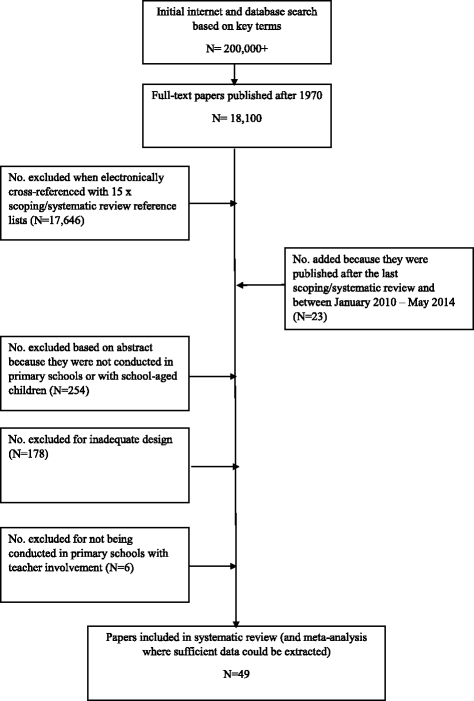Teaching approaches and strategies that promote healthy eating in primary school children: a systematic review and meta-analysis
- PMID: 25889098
- PMCID: PMC4416340
- DOI: 10.1186/s12966-015-0182-8
Teaching approaches and strategies that promote healthy eating in primary school children: a systematic review and meta-analysis
Abstract
Background: Healthy eating by primary school-aged children is important for good health and development. Schools can play an important role in the education and promotion of healthy eating among children. The aim of this review was to: 1) perform a systematic review of randomised controlled, quasi-experimental and cluster controlled trials examining the school-based teaching interventions that improve the eating habits of primary school children; and 2) perform a meta-analysis to determine the effect of those interventions.
Methods: The systematic review was limited to four healthy eating outcomes: reduced food consumption or energy intake; increased fruit and vegetable consumption or preference; reduced sugar consumption or preference (not from whole fruit); increased nutritional knowledge. In March 2014, we searched seven electronic databases using predefined keywords for intervention studies that were conducted in primary schools which focused on the four healthy eating outcomes. Targeted internet searching using Google Scholar was also used. In excess of 200,000 possible citations were identified. Abstracts and full text of articles of potentially relevant papers were screened to determine eligibility. Data pertaining to teaching strategies that reported on healthy eating outcomes for primary school children was extracted from the 49 eligible papers.
Results: Experiential learning strategies were associated with the largest effects across the reduced food consumption or energy intake; increased fruit and vegetable consumption or preference; and increased nutritional knowledge outcomes. Reducing sugar consumption and preference was most influenced by cross-curricular approaches embedded in the interventions.
Conclusions: As with most educational interventions, most of the teaching strategies extracted from the intervention studies led to positive changes in primary school children's healthy eating behaviours. However, given the finite resources, increased overcrowding of school curriculum and capacity of teachers in primary schools, a meta-analysis of this scope is able to provide stakeholders with the best evidence of where these resources should be focused.
References
-
- National Health and Medical Research Council. Australian Dietary Guidelines. Canberra: Australian Government; 2013.
-
- Gill T, King L, Webb K. Best options for promoting healthy weight and preventing weight gain in NSW. Sydney: NSW Centre for Public Health Nutrition; 2005.
Publication types
MeSH terms
LinkOut - more resources
Full Text Sources
Other Literature Sources
Medical
Research Materials


